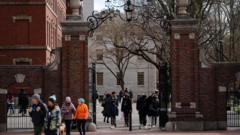The Trump administration has posed an ultimatum to Harvard University, threatening to impose a ban on foreign student enrollment unless the institution complies with a series of sweeping demands aimed at combatting antisemitism. In a resolute response, Harvard President Alan Garber has rejected the White House's requisitions, affirming the university’s commitment to its independence and constitutional rights.
Homeland Security Secretary Kristi Noem has accused Harvard of "threatening national security" by allegedly failing to address antisemitism effectively on campus. The administration has requested records related to international students—who constitute over 27% of Harvard's enrollment—and their visa status, citing concerns over supposed "illegal and violent" actions.
“Harvard can no longer be considered even a decent place of learning,” Trump declared on his Truth Social platform. He further hinted at the potential loss of millions in federal funding stemming from a revoked tax exemption, alongside a freeze placed on $2.2 billion in federal funds.
The increasing scrutiny directed at Harvard aligns with the Trump administration’s broader agenda, which has targeted universities perceived as hostile to right-leaning perspectives. However, Harvard's stance exemplifies a pushback against these pressures. In recent months, the university has made adjustments, such as dismissing certain leaders from its Center for Middle Eastern Studies following accusations of insufficient representation for Israeli viewpoints.
Nevertheless, Harvard's posture has drawn attention amidst a critical conversation about the safety and experiences of Jewish students on campus. Since initiating its antisemitism task force earlier this year, the government has been reviewing practices across various universities. Columbia University recently capitulated to an array of similar demands, raising questions about academia's response to such political pressures.
As Harvard navigates this challenging landscape, its ability to maintain academic integrity and uphold its principles remains uncertain, especially in light of ongoing demands from the Trump administration.





















